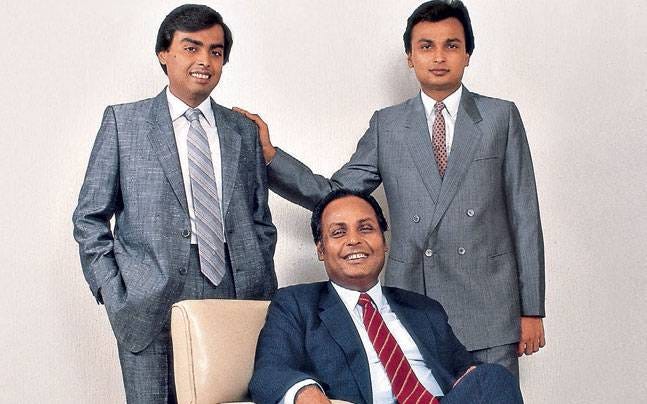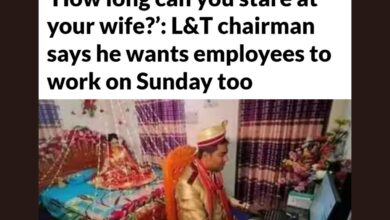Kalyani Family, Bharat Forge Feud Intensifies, Hiremath Siblings Pursue Legal Action for HUF Asset Share; Why Do India Inc. Dynasties End Up In Bitter Legal Battles??
The ongoing dispute within the Kalyani family, descendants of Nilkanthrao A. Kalyani, founder of Bharat Forge, in 1961, again spotlights the familiar story of familial conflicts over business inheritance within India Inc. The latest twist involves Bharat Forge's chairman, Baba Kalyani, and his sister, Sugandha, with their children initiating legal action to partition the family assets. Central to the dispute is the alleged unequal distribution of assets and governance issues, particularly concerning Hikal, a subsidiary of the Kalyani Group.

The ongoing feud among the descendants of Nilkanthrao A. Kalyani, who has been at the helm of Bharat Forge since its establishment in 1961, remains a familiar tale within India Inc., where familial disputes over the control and management of inherited enterprises are commonplace.
However, a fresh chapter has begun in the discord between Bharat Forge’s chairman, Baba Kalyani, and his sister, Sugandha, as their children, Sameer and Pallavi, offspring of Sugandha and Jai Hiremath, initiate legal action in a Pune court.
Their lawsuit seeks to partition the assets of the Kalyani Hindu Undivided Family (HUF), including Bharat Forge and other publicly traded and privately held entities, in order to secure their rightful share.
The rift between the Hiremaths and Baba Kalyani stems from disagreements over the governance of Hikal, a Kalyani Group subsidiary.
The Hiremaths escalated the matter to the Bombay High Court in 2023, alleging that Kalyani had reneged on a familial agreement, purportedly established with his father, promising the transfer of all Hikal shares to them.
Baba Kalyani countered, asserting that the 1994 family arrangement was merely a non-binding memorandum by his father, Neelkanth Kalyani; the legal dispute remains unresolved.

The combined market capitalization of the listed companies under the Kalyani Group stands at ₹69,300 crore.
Responding to the allegations, a spokesperson for the Kalyani family labelled them as factually inaccurate, misconstrued, and driven by malicious intent.
Sameer and Pallavi Hiremath, however, claim that Baba Kalyani has exclusively benefited from the HUF’s assets without disclosing pertinent information to the wider family.
They emphasize the foundational role played by their great-grandfather, Annappa N Kalyani (ANK), in establishing the family’s business legacy.
Notably, Bharat Forge holds a dominant position within the group, commanding a valuation of ₹52,600 crore, with the Kalyani Group retaining a 45.25% ownership stake.
Hikal, on the other hand, boasts a market value of ₹3,324 crore as of the latest trading session.
The lawsuit underlines Annappa Kalyani’s utilization of family funds across various business ventures, including companies, proprietary concerns, or partnership firms, with active involvement from Neelkanth Kalyani.
It emphasizes that assets currently held within the family, regardless of individual ownership, constitute part of the Hindu Undivided Family (HUF) and should be factored into any partition proceedings.
The siblings assert their rights as coparceners in the Kalyani Family HUF, citing the 2005 Amendment to Section 6 of the Hindu Succession Act, 1956, thus maintaining their entitlement to seek partition of the Kalyani Family HUF based on their coparcenary status.
The lawsuit lists various assets, including listed and privately held companies, partnerships, shares, immovable properties, bank accounts, and other investments, all considered part of the undivided family’s assets.
It stresses that these businesses and investments originated from the joint family under Annappa Kalyani’s leadership, thus forming integral components of the joint family’s properties.
The discord between Sugandha Hiremath and Baba Kalyani, siblings within a prominent business family, erupted following their mother’s demise in 2023.
Sugandha, a non-executive director at Hikal, a pharmaceutical and chemicals company, has accused her brother, Baba Kalyani, the Chairman and Managing Director of Bharat Forge, of attempting to sideline her and her husband from Hikal’s affairs.
Notably, the Hiremaths own approximately 35% of Hikal, while Kalyani holds a 34% stake.
Central to the dispute is a 1994 family arrangement, which purportedly obligates Kalyani to transfer his entire Hikal stake to the Hiremaths.
However, Kalyani refutes this claim, dismissing the transfer clause in the 1994 arrangement as false.
Sugandha contends that the 1994 agreement was reached between her parents and Kalyani, with the presence of notable figures like N. Vaghul and S. S. Nadkarni at the Taj Mahal Hotel in Mumbai. Contrarily, Kalyani maintains that the Taj meeting solely addressed ownership issues at Bharat Forge and Kalyani Forge.

The Sad Truth About Family-Run Business In India
The events mentioned above mirror a common occurrence in India Inc., where historical family agreements, often informal and lacking legal validity, become subjects of contention among subsequent generations.
In India, a significant portion of businesses, ranging from small enterprises to conglomerates like Reliance, are family-owned.
These family-run enterprises have played a key role in shaping India’s business landscape, offering valuable lessons for larger corporate entities to glean from their success.
However, as these family businesses progress, conflicts among family members frequently arise, ultimately landing them in courtrooms.
Generational Curse
The trend often emerges with subsequent generations, where the inclusion of uncles, cousins, and in-laws complicates matters; unlike the original founders who established the business, helming succession and defining roles becomes challenging for a multitude of family members.
Hence, court disputes become inevitable due to the founders’ dependence on informal arrangements rather than legally binding agreements.
The absence of a well-defined succession plan has emerged as a significant challenge for many otherwise prosperous and esteemed family-owned businesses in India.

The acrimonious fallout following the demise of Dhirubhai Ambani, where brothers Mukesh and Anil Ambani engaged in a bitter feud resulting in the division of the Reliance empire, is an example of this dilemma.
Generational shifts within family-owned businesses often introduce tensions between longstanding principles and the evolving perspectives of newer generations.
While the enduring principles and codes have historically underpinned the success of family enterprises, they can strain under the influx of novel ideas brought forth by subsequent generations.
This generational disruption frequently precipitates conflicts, particularly during the transition from traditional to modern economic paradigms, necessitating adjustments and innovations.
Experts argue that as family-owned businesses expand and newer family members assume roles, a visible dissonance emerges between familial values and business objectives.
The family may adhere to a socialist model of wealth distribution, while the business rewards meritocracy.
Hence, differences surface when certain family members perceive unequal recognition, lack of appreciation for their opinions, or unmet needs.
Furthermore, ambiguity surrounding roles, rights, and responsibilities due to a dearth of clear policies often leads to ad-hoc decision-making and inconsistency, and when left unaddressed, these disparities foster feelings of injustice and resentment among family members.
Eventually, unresolved tensions reach a breaking point, resulting in a cascade of detrimental consequences, including misguided actions, poor decisions, and erosion of both wealth and familial legacy.




